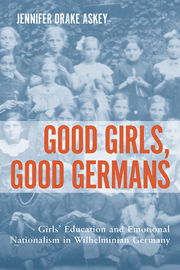Book contents
- Frontmatter
- Dedication
- Contents
- Acknowledgments
- Introduction: Emotional Nationalism and Germany’s Daughters
- 1 Nationalist Education and Prussia's höhere Töchter
- 2 Father's Library: German Classics in Girls' Schools and the Ownership of German Culture
- 3 Mädchenliteratur I—Backfischbücher and Historical Novels
- 4 Mädchenliteratur II—Queen Luise
- Conclusion
- Bibliography
- Index
1 - Nationalist Education and Prussia's höhere Töchter
Published online by Cambridge University Press: 05 August 2013
- Frontmatter
- Dedication
- Contents
- Acknowledgments
- Introduction: Emotional Nationalism and Germany’s Daughters
- 1 Nationalist Education and Prussia's höhere Töchter
- 2 Father's Library: German Classics in Girls' Schools and the Ownership of German Culture
- 3 Mädchenliteratur I—Backfischbücher and Historical Novels
- 4 Mädchenliteratur II—Queen Luise
- Conclusion
- Bibliography
- Index
Summary
Schools for Girls—Mädchenschulen
The Unification of Germany and the founding of the second German empire in 1871 under Prussian chancellor Bismarck and Emperor Wilhelm I ushered in a period of great national pride. Prussia's successful wars against Denmark, Austria, and France culminated in the proclamation of the German empire in the Hall of Mirrors in Versailles and contributed to a general feeling of German national destiny that inextricably linked the fate of Prussia and the Hohenzollern dynasty with the fate of Germany as a whole. This increased national confidence, along with the expansion of the Prussian state bureaucracy into new areas of empire, led to calls for a new national emphasis in the education of the next generation of German citizens. The middle and upper middle classes—civil servants, professionals, and businessmen—enjoyed a feeling of social, political, and economic importance unknown to them before, and sought to solidify their position by institutionalizing their cultural values and their positivist view of German history in schools to educate their sons and daughters. Specifically, educators and the government agencies that oversaw schools began examining the subjects taught to pupils in elementary Volksschulen and in secondary schools—Gymnasien and höhere Bürgerschulen for boys and mittlere and höhere Töchterschulen for girls—and evaluating them according to their ability to inspire love for the German fatherland and to encourage their identification with their predetermined role in the nation-state.
- Type
- Chapter
- Information
- Good Girls, Good GermansGirls' Education and Emotional Nationalism in Wilhelminian Germany, pp. 29 - 58Publisher: Boydell & BrewerPrint publication year: 2013



